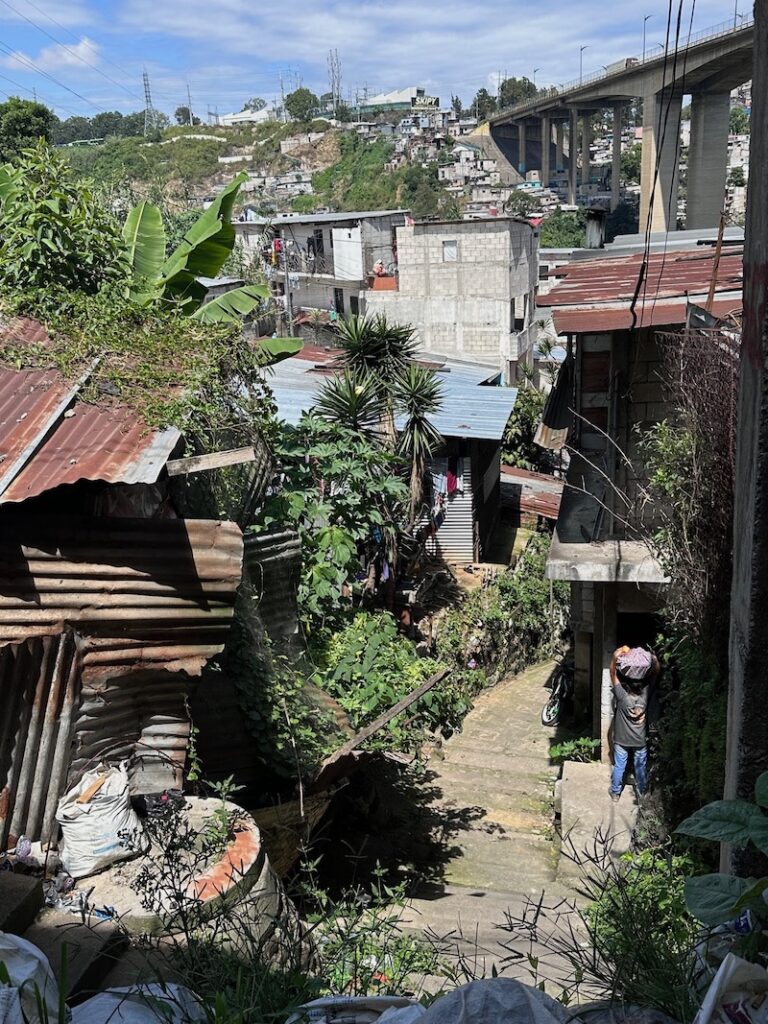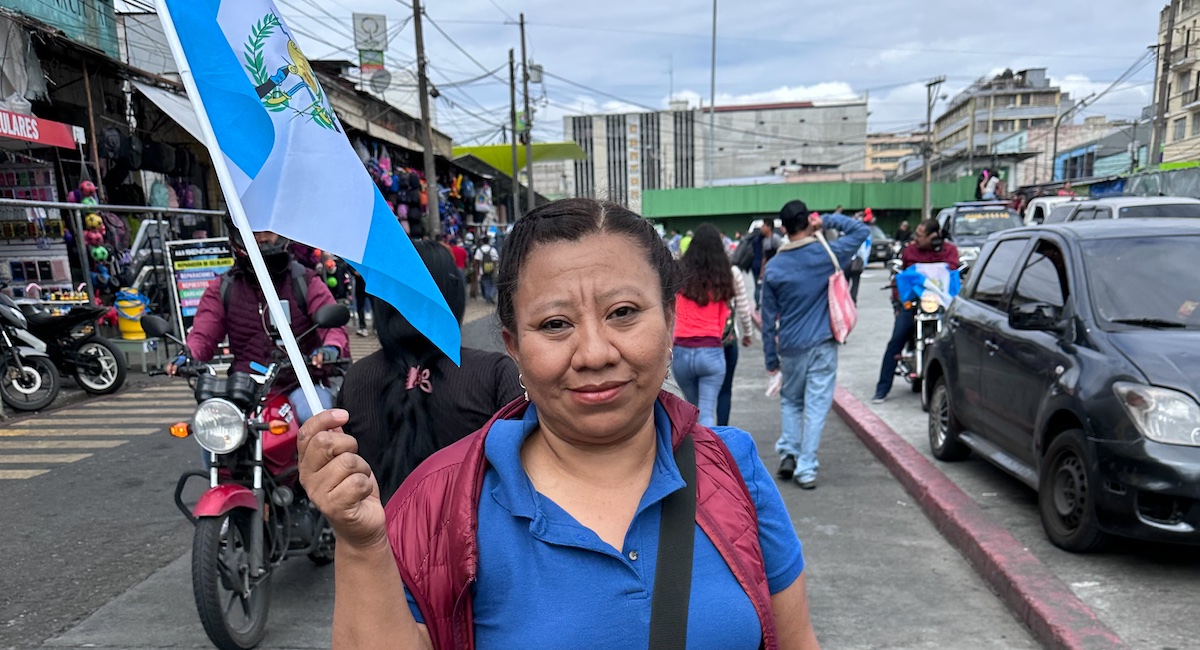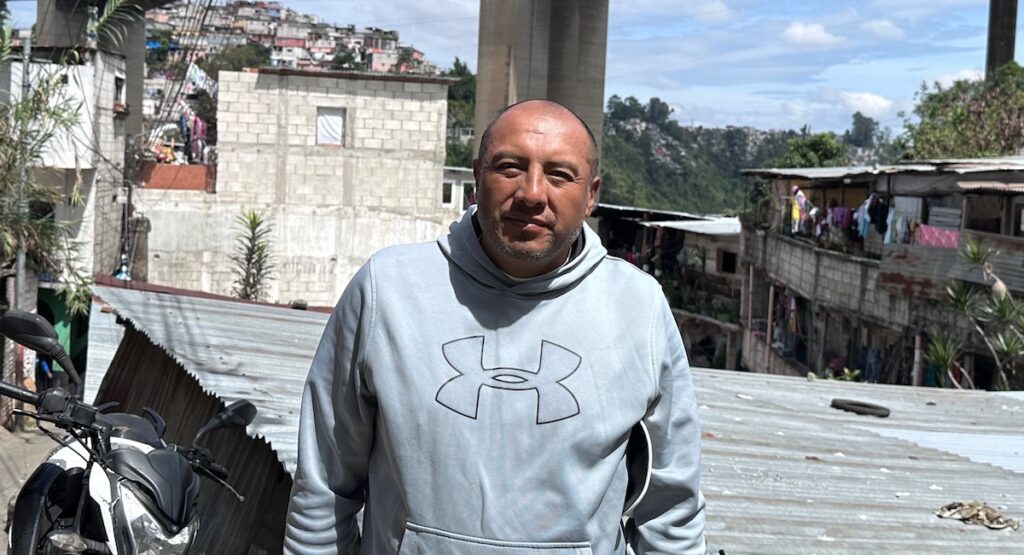Above: Marta Tecun, 52, is among the tens of thousands across Guatemala protesting efforts by the current administration of Alejandro Giammattei to derail recent elections that saw left-leaning social democrat Bernardo Arevalo win in a landslide victory. (Image credit: Mary Jo McConahay)
GUATEMALA CITY – Hundreds of feet below a shiny silver bridge that daily carries tens of thousands of speeding cars to the city center, Guatemala’s political crisis is sparking hope among people living in this steep urban canyon called El Incienso.
“This may be our last chance to change things around, to get rid of corruption and get a real democracy,” said Erwin Rivera, president of the neighbors’ committee of this 80-year old community of about 5,000. “We want to become visible.”
Rivera, 48, was taking his first break after 15 days manning a barricade of burning tires on the bridge, one of dozens of roadblocks set up by demonstrators countrywide to protest government attempts to derail the January inauguration of social democrat President-Elect Bernardo Arevalo. “We asked pardon of the drivers,” Rivera said. “But we consider that we are defending ourselves by defending the election.”
El Incienso is a crowded colonia where there is no clinic, no place to buy milk, where a priest arrives only once a year to say mass in its small yellow church, a “red zone” considered too dangerous for companies to send workers to install telephone or internet connections. Inhabitants appear to have nothing to lose by protesting the status quo. Concrete paths too narrow for a car connect small abodes that appear pegged almost miraculously to steep slopes. The deeper you descend into the ravine the poorer the houses look, until the paths disappear altogether into winding stairs. Sometimes, a body falling from the silvery bridge – a favorite jumping place for suicides – will crash into a house below, neighbors say, or fall onto a patio.
According to researchers from the international study group TECHO, funded by the European Union, some 57 marginalized settlements like El Incienso exist in Guatemala City, with 97 others in zones on the urban fringes, precariously built, often subject to landslides, lacking one or more basic services such as water, electricity or sewage, conditions that help drive the outflow of migrants to the US border.
Neighborhood leaders, meanwhile, complain that if they are not connected to the ruling party, their colonias must struggle to receive municipal benefits. This makes Bernardo Arevalo’s anti-graft campaign resonate with residents like Rivera, who voted for the president-elect but does not belong to his Semilla (“Seed”) party.
Indeed, in a country where party flags have always been ubiquitous at political gatherings, from the night of August 20 when throngs gathered to celebrate Arevalo’s victory, to now when supporters demonstrate on the streets and highways, the only banner they carry is the blue and white national flag.

Erwin Rivera is part of an emerging national leadership being forged during the crisis outside traditional parties. They are neighborhood leaders who once were more likely to organize sports teams than protest actions, representatives of peasant organizations, university students, labor unions like employees of Coca-Cola and the national university. Representatives of hundreds of indigenous communities, once barely acknowledged outside their rural locales, have been at the forefront of national organizing against government attempts to steal Arevalo’s victory.
The new leadership’s allegiance is not to parties but to a countrywide movement to protect Guatemala’s 37-year-old democracy, which under outgoing President Alejandro Giammattei has been battered by allegations of widespread corruption, with officials forcing a number of honest magistrates into exile and throwing journalists who exposed the graft into jail. An exhausted population cast its vote for Arevalo, a relatively unknown congress member who promised deep change.
The current crisis began when authorities questioned – Trump style – the validity of Arevalo’s win. Attorney General Consuelo Porras suspended Semilla’s legal standing, launching court cases against the party as well as the federal voting authority, known by its initials TSE, which had validated the landslide election. Prosecutors sent black-masked police to raid Semilla and the TSE. Videos show heavily armed units hitting the offices like SWAT teams, leaving with armfuls of document boxes. It was the straw that broke the camel’s back.
Crowds poured into the streets, blocking urban arteries and rural highways at more than a hundred points, demanding protection for the democratic system. Led by indigenous Maya authorities, thousands descended on the Public Ministry – the Attorney General’s offices – in the capital, where many remain today, calling for the resignation of Porras and three other figures behind what they call “a coup in slow motion.”
“They want to interrupt the inauguration,” said 58-year-old Mateo Comatz of Pixabaj, a Maya community 47 miles east of the capital. Comatz, who said he had slept on the sidewalk outside the ministry wrapped in a blanket for the previous sixteen nights, carried the ceremonial staff that marked him as an alcalde indigena, a local leader unpaid but responsible for the wellbeing of his community for a certain term. “They had no right to go into the TSE. They are doing much damage. We are going to stay here until they leave.”
Elsewhere in the capital, noisy marches of market sellers interrupted traffic. “I am losing money by not being in my stall today, by being here instead,” said Marta Tecun, 52, who sells used clothing at the Landivar market. “But if what we are doing – defending democracy – doesn’t work, I will lose much more.”
In recent days protesters are modifying tactics, led by an indigenous entity, the Council of Authorities of the 48 Cantones (districts) of Totonicapán department, which has met with Giammattei, with the president of the congress, and national police. Some roadblocks have opened two of four highway lanes, for instance, and ordinary employees of the Attorney General’s office along with citizens with business inside are being allowed to enter. But the force of opposition to stealing the presidential election appears unwavering.
“Today the streets and highways of our country are inundated with peaceful protest, with rejection of the coup and its perpetrators,” Arevalo told a cheering crowd during a commemoration of the democratic “October Revolution” of 1944. That event led to elections won by Arevalo’s father, inaugurating what has been called the “Ten Years of Spring,” an era of reforms that ended with a CIA coup.
“We are coming to a new spring,” Arevalo told the crowd, calling for “a new revolution in peace and harmony.” The people of Guatemala, he said, “do not give up.”
Mary Jo McConahay is a prize-winning author, documentary filmmaker and freelance journalist whose books include “Maya Roads” about her three decades of traveling and living in Central America’s remote landscapes.






